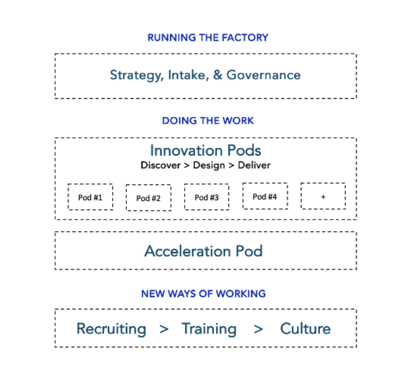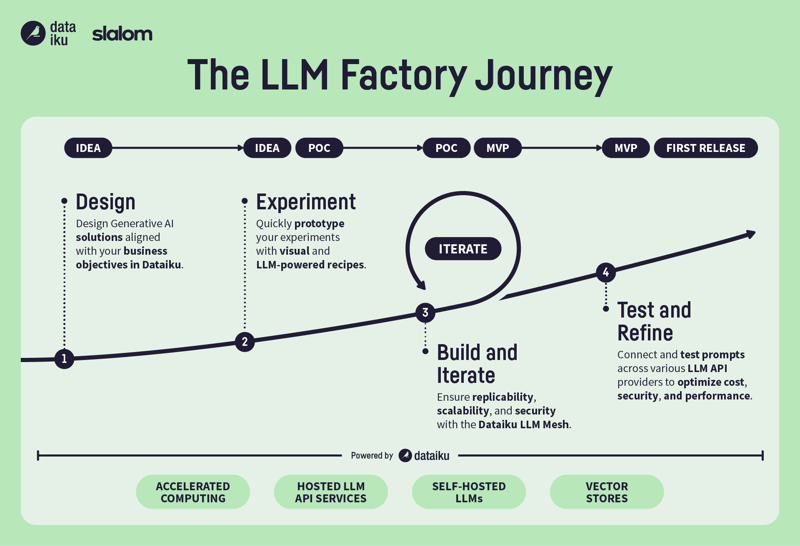In an era where the digitization of industries is not just an advantage but a necessity, the concept of AI factories is revolutionizing the way we think about production, development, and deployment of AI.
Echoing the successful partnership between Nvidia and Foxconn to create "AI factory data centers", the collaboration between Dataiku and Slalom to develop the LLM Factory accelerates the transformative journey for enterprises looking to harness the full potential of Generative AI. The LLM Factory is designed to tackle the multifaceted challenges identified where 87% of executives report significant hurdles during AI transformation (internal Slalom survey conducted fall of 2023).
The LLM Factory is not merely a product of technological advancement; it is the embodiment of a strategic vision that unites the technical orchestration layer of Dataiku's LLM Mesh with the operational efficiencies of Slalom's Impossible Factory framework. This convergence is designed to deliver a sophisticated Dataiku environment where Large Language Models (LLMs) are not just created but are crafted with precision, efficiency, and at an industrial scale.
Scaling With Structure
Scaling LLMs poses distinct challenges that spotlight the intricacies of advanced AI deployment. At the heart of the issue is the nuanced nature of LLM outputs, which can vary significantly and are rooted in vast, sensitive datasets, raising critical concerns around consistency, privacy, and usage. Coupled with the need for clear explainability to satisfy regulatory and business scrutiny, and the necessity for agility amidst a fast-evolving governance landscape, the task of scaling LLMs becomes a complex endeavor that touches on some of the most pressing issues in AI development today.
One of the biggest limiters of realizing the value of GenAI solutions is user readiness. We expect precise, deterministic results from our interactions of technology. However, in real life, nearly all designs of service or products have an industry standard of error tolerance. We’ve found the best way to get past this barrier is to bring these solutions to life in a tangible, simulated experience – in other words, bring our readiness to receive these innovative solutions.
-Tony Ko, Managing Director of AI, Slalom
What Is the LLM Factory?
(Dataiku’s Powerful AI/ML Platform) x (Slalom’s Impossible Factory) = LLM Factory
The journey from AI conception to production is complex and requires not just technical proficiency but also a strategic vision. The LLM Factory provides a clear and actionable blueprint for success as businesses seek to navigate the complexities of AI adoption. It embodies the principles of the AI industrial revolution, where intelligence is not just produced — it's manufactured with the same rigor, precision, and scale as any physical product in a conventional factory. The LLM Factory offers a glimpse into a future where AI is integral to every aspect of business operation.
Once the efficacy of the LLM Factory is established, we focus on building the necessary infrastructure to scale these solutions throughout your organization. This holistic approach encompasses everything from establishing a robust governance structure to refining execution methodologies and transforming ways of working, all aimed at driving sustained innovation.

To scale the deployment of LLMs into production effectively, the LLM Factory framework introduces:
- Innovation Pods: These are cross-functional teams assembled within a unified space to assess requirements and develop AI solutions efficiently. The goal is to ensure rapid, repeatable, and scalable execution that aligns with emerging business use cases.
- Acceleration Pod: By leveraging foundational models and reusable components, the Acceleration Pod significantly reduces development time, streamlining the path from concept to deployment.
Innovation is an iterative and non-linear journey. A LLM Factory doesn't just enhance skill sets; it nurtures a culture of continuous learning, encouraging teams to question, experiment, and learn from each stage of development. This ethos is critical in navigating the AI landscape's inherent complexities, from aligning with organizational strategies to managing the rapid evolution of AI technologies.
The LLM Factory Process:
- Design: Kickstart the process by designing innovative AI solutions aligned with strategic business objectives in Dataiku. The collaborative platform enables both business and tech executives to develop and iterate on cutting-edge projects through a simple to use visual interface
- Experiment: Cultivate a testbed where hypotheses are validated through practical experimentation using Dataiku to quickly prototype your Generative AI experiments with the help of visual and LLM-powered recipes.
- Build and Iterate: Develop prototypes, POCs, MVPs, and AI Production Lines that are both repeatable and scalable as Dataiku’s LLM Mesh empowers enterprises to get started without sacrificing on quality or security.
- Test and Refine: Rigorously assess AI models to ensure they meet the required standards for real-world application via Dataiku’s LLM Mesh. The LLM Mesh architecture allows customers to connect and test prompts across various LLM API providers to optimize cost, security, and performance.

Conclusion
By integrating the LLM Factory into an organization's AI strategy, companies can transform how they develop, deploy, and scale LLM solutions. This combination of technology and a framework is not just a series of steps but a strategic blueprint for scaling AI deployment to meet the demands of modern businesses, ensuring AI solutions are delivered with speed, efficiency, and a focus on creating strategic value.
The establishment of the LLM Factory marks a significant milestone in the journey towards AI maturity for businesses. By leveraging the LLM Factory, companies can now look forward to building a robust, dynamic, and scalable ecosystem with confidence. This is not just about keeping pace with technological advancements; it's about setting the pace, driving innovation, and crafting a future where AI is at the heart of business transformation.




